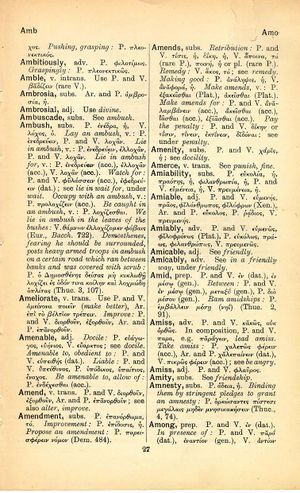ambrosia: Difference between revisions
ἀλλ᾽ οὐδὲ εἷς τέκτων ὀχυρὰν οὕτως ἐποίησεν θύραν, δι᾽ἧς γαλῆ καὶ μοιχὸς οὐκ εἰσέρχεται → but no carpenter ever made a door so secure that a weasel or a womanizer could not pass through it
(6_1) |
m (Text replacement - "]]>" to "]]") |
||
| Line 5: | Line 5: | ||
}} | }} | ||
{{Lewis | {{Lewis | ||
|lshtext=<b>ambrŏsĭa</b>: ae, f., = [[ἀμβροσία]] | |lshtext=<b>ambrŏsĭa</b>: ae, f., = [[ἀμβροσία]].<br /><b>I</b> Lit., [[ambrosia]], the [[food]] of the gods (as [[nectar]] [[was]] [[their]] [[drink]]): non [[enim]] ambrosiā deos aut nectare laetari [[arbitror]], Cic. Tusc. 1, 26, 65; Ov. P. 1, 10, 11: Suaviolum dulci dulcius ambrosiā, Cat. 99, 2.—Hence: [[orator]] ambrosiā alendus, prov. [[once]] in Cic., qs. a [[god]] [[among]] orators, of a [[distinguished]] [[orator]] (opp. [[faenum]] esse), Cic. de Or. 2, 57.— Also [[food]] for the steeds of the gods: equos ambrosiae [[suco]] saturos, Ov. M. 2, 120; 4, 215 (acc. to Hom. Il. 5, 368 and 369).—<br /><b>II</b> Transf.<br /> <b>A</b> The [[unguent]] of the gods (so, [[ἀμβροσία]], Hom. Il. 14, 170; 16, 670): ambrosiā cum dulci nectare mixtā Contigit os, Ov. M. 14, 606: liquidum ambrosiae diffundit odorem, Verg. G. 4, 415; id. A. 12, 419.—<br /> <b>B</b> The [[name]] of [[several]] plants, esp. of the [[botrys]] or artemisia, Turkish mugwort: Choenopodium [[botrys]], Linn.; Plin. 27, 4, 11, § 28.—Another [[plant]] of this [[name]], Plin. 27, 8, 31, § 55.—<br /> <b>C</b> An [[antidote]] to [[poison]], Cels. 5, 23. | ||
}} | }} | ||
Revision as of 09:31, 13 August 2017
English > Greek (Woodhouse)
subs.
Ar. and P. ἀμβροσία, ἡ.
Latin > English (Lewis & Short)
ambrŏsĭa: ae, f., = ἀμβροσία.
I Lit., ambrosia, the food of the gods (as nectar was their drink): non enim ambrosiā deos aut nectare laetari arbitror, Cic. Tusc. 1, 26, 65; Ov. P. 1, 10, 11: Suaviolum dulci dulcius ambrosiā, Cat. 99, 2.—Hence: orator ambrosiā alendus, prov. once in Cic., qs. a god among orators, of a distinguished orator (opp. faenum esse), Cic. de Or. 2, 57.— Also food for the steeds of the gods: equos ambrosiae suco saturos, Ov. M. 2, 120; 4, 215 (acc. to Hom. Il. 5, 368 and 369).—
II Transf.
A The unguent of the gods (so, ἀμβροσία, Hom. Il. 14, 170; 16, 670): ambrosiā cum dulci nectare mixtā Contigit os, Ov. M. 14, 606: liquidum ambrosiae diffundit odorem, Verg. G. 4, 415; id. A. 12, 419.—
B The name of several plants, esp. of the botrys or artemisia, Turkish mugwort: Choenopodium botrys, Linn.; Plin. 27, 4, 11, § 28.—Another plant of this name, Plin. 27, 8, 31, § 55.—
C An antidote to poison, Cels. 5, 23.

